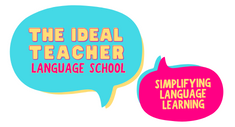Reflective Practice in Teaching
This week was the first week back to school for The Ideal Teacher after the Easter holidays and although it went quickly, it was pretty intense! I came straight home on Monday at 5pm and went to sleep – not the ideal start to the week, but it shows how much and how quickly you can get out of the swing of your normal routine.
Despite the shock to the system, I enjoyed my lessons and made some progress in my aim to becoming ‘The Ideal Teacher’ this week. If you’re interested in my journey of reflective practice in teaching, please read on! If reflective teaching is not your thing, choose one of the links at the top of the website (excluding Reflections) and you’ll find lots of creative teaching ideas for the language classroom, which include links to downloadable handouts for you to use in the classroom.
Why is reflection important?
Reflecting back on what went well in a lesson, what could be improved in a lesson or how a situation was handled is quite important to becoming a better teacher. It allows you to determine if your teaching practice is successful and if it wasn’t what can be done to ensure that it is improved for the future. Whilst I reflect on my teaching after each lesson, I feel it is important to write these reflections down too, in order to jog my memory and actually see my journey to becoming The Ideal Teacher. Reflective practice in teaching is very important to me and I truly believe reflecting back on the positives and areas to improve helps us all to become better teachers.
I will aim to write about what went well once a week, as well as areas of improvement – my very own WWW and EBIs! I hope it helps you to see the benefits of reflective teaching practice, too!
 The Ideal Teacher’s WWW of The Week
The Ideal Teacher’s WWW of The Week
1. One of my year 10 German groups did amazingly well on their mock German exams that I marked over the holidays, which included GCSE style listening, reading, writing and translation examinations. They were proud of themselves and I was too! The students really understand the elements they need to include to get the higher grades in their writing and produce detailed and original work. Many of them have learned the elements within the KS3 French and GCSE French Writing Marksheet for Feedback by heart and were able to obtain two grades higher than their FFT (Fisher Family Trust) Target just by incorporating the right elements.
Out of all of the skills they were assessed on, I can see their listening skills need developing further and so I will focus on discussing the pitfalls for this skill, as well as practising more listening in lessons. I will also guide them to my 8 German Listening Websites for GCSE (3380 downloads ) over the coming weeks and ask them to choose something for homework to improve further. I read something about Narrow Listening skills recently, so I will probably look into that a little more, too.
Two particular students impressed me this week. Both of them were putting little effort into German since the beginning of the year, but now seem a lot more engaged. I gave them both the MFL Pupil of the Week award this week, as well as praising them. This, combined with them seeing an improvement in their grades will, hopefully, help them to continue to be engaged!
2. On Wednesday, I decided that I needed to use more of the amazing creative teaching ideas that I find are shared daily on social media, as well as online – you can read about that here if you’d like: Emojis Vocabulary Builder . So I used two of these creative teaching resources in my lessons this week, including the Emojis vocabulary builder just mentioned, as well as @MissMeyrick’s Vocab Workout Starter. Often, I just tell students to write a sentence using a new word, but this actually got them thinking. I used it with two classes to introduce new topic vocabulary (they were allowed to use dictionaries if they wanted).
I chose words that we have either seen before, for revision purposes, or words that I knew students often pronounced or spelled incorrectly, such as ‘les élèves’, ‘le collège’ and ‘Süßigkeiten’ but it worked well, especially for focusing on accents, umlauts and pronunciation. It also allowed students to be creative with their language. One of my students, wrote: ,Wenn es Valentinstag ist, weint meine Schwester immer, weil sie einsam ist, aber ich lache’ (when it’s Valentine’s Day, my sister always cries, because she is alone, but I laugh). I should have taken this opportunity to teach the class: ,ledig’ – single, here… next lesson!
3. This week, I inherited 11 students from another year 8 French class, which has been split between two classes, due to a teacher leaving. These students include some students with challenging behaviour, as well as low ability. I didn’t find this ideal, since my 20-student group has a great dynamic. However, I have realised that this is the nature of teaching and welcomed the challenge. In the first lesson, I could see that the 11 students weren’t used to high expectations or challenging work, so I came down hard with my classroom expectations and behaviour expectations. The students who displayed signs of challenging behaviour didn’t respond well, so I gave them warnings as per the school’s behaviour policy and by the end of the lesson, two students had SIMS entries and detentions and one student had an After School Detention.
I re-advised my expectations at the end of the lesson and followed through with the sanctions. I also spoke to these specific students individually, in order to show them I was still approachable and as long as they did what was expected, we would get along fine. The following lesson, I only had to sanction one (different) student. I am hoping that as long as I re-enforce and maintain my high expectations and include differentiated and engaging activities, the lessons should continue well – fingers crossed!
The Ideal Teacher’s EBIs For The Week
There is only one main area that I feel could be improved this week and that includes a behavioural issue with one student who refuses to follow the school’s behaviour expectations and continues to be sent out of lessons. As a department, we have found a temporary resolution. Let’s see what happens here though.
Thanks for reading about my journey to becoming The Ideal Teacher! If reflective practice in teaching is of interest to you, please come back next week to see my progress and read my next teaching reflection…
JOIN ME ON MY SOCIALS FOR MORE FAB TEACHING CONTENT >>





